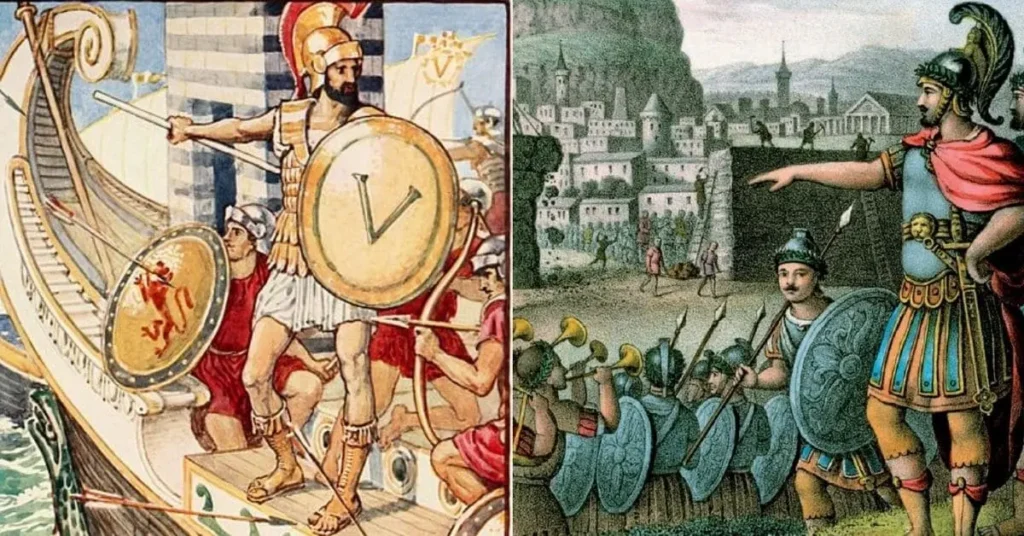The Spartan Warriors were known for being really good at fighting in wars. It does not come as a surprise that some of these warriors were so impressive that they turned into figures of legend.
They were not just deadly fighters but also played a key role in Greek politics. Many of them are still remembered to this day and stories about them have become legendary. Who were these Spartan warriors, and what action did they perform to become figures of legend? Let’s find out.
Brasidas – Hero of the Peloponnesian War
Brasidas, a prominent figure in the Peloponnesian War, was a distinguished Spartan officer during its early years. He died in 422 BC during the Second Battle of Amphipolis while securing a significant victory. Born to Tellis and Argileonis, Brasidas gained recognition for leading the relief of Methone, besieged by Athenians in 431 BC. He showcased his tactical skills at the Battle of Pylos in 429 BC, where he was severely wounded.

In 424 BC, Brasidas mustered forces in Corinth for a Thrace campaign, displaying strategic acumen by frustrating an Athenian attack on Megara. Brasidas’ campaign in Thrace showcased his strategic brilliance, winning over cities like Acanthus, Amphipolis, Stagirus, and Toroni during the winter campaign.
Despite a truce in 423 BC, Brasidas clashed with Scione, earning a golden crown and the title “Liberator of Hellas.” He later faced political tensions with Perdiccas II of Macedon. Brasidas used his diplomatic skills to navigate complex relations with Perdiccas II of Macedon and the Lyncestians.
In his final victory at Amphipolis in 422 BC, Brasidas employed a surprise attack, leading the Spartans to success. Though Cleon fell, Brasidas was mortally wounded and buried with honors. Recent archaeological findings at Amphipolis point toward his burial site. Many important artifacts were found at Brasidas’ alleged burial site, including a silver chest and gold wreath, signifying his importance in Spartan history.
Leonidas I – The King Who Became a Legend
Leonidas, the legendary king of Sparta, is likely the most popular king from Ancient Sparta. Lived from 540 to 480 BC, he became a legendary figure through his heroic stand at the Battle of Thermopylae. Born into the royal lineage as the son of King Anaxandrides II, Leonidas’ name is thought to mean either “son of a lion” or “like a lion.” Married to Gorgo, the daughter of Cleomenes I, Leonidas succeeded to the throne around 490 BC.
In the summer of 480 BC, the Persian king Xerxes invaded Greece with a massive army. Leonidas, leading 300 Spartans and joined by approximately 4,000 Greek soldiers, took a defensive position at Thermopylae, a narrow passage in central Greece. Despite overwhelming odds against the Persian army of 80,000, the Greeks resisted for two days.
Leonidas, renowned for his courage as the greatest spartan warrior, famously replied “Come and get them!” when Xerxes demanded the Greeks surrender. However, Ephialtes, a local man, betrayed the Greeks, revealing a secret passage to the Persians. Realizing the impending danger, Leonidas urged the other Greeks to retreat. He, along with his 300 Spartans and 700 Thespians who refused to leave, stayed back to cover the escape.
In a last stand, Leonidas and his small force fought valiantly but were ultimately overwhelmed and killed. This sacrifice bought crucial time for the Greeks and showcased the unwavering spirit of resistance against foreign oppression. Leonidas’ legacy endures, and a modern monument at Thermopylae commemorates this historic act of courage. The tomb of the legendary king rests in his homeland, Sparta.
Lysander – The Commoner Who Rose Through the Ranks
Lysander, a member of the Heraclidae in Sparta, rose to prominence despite not belonging to the royal families, and little is known about his early life. During the Peloponnesian War, Lysander played a significant role in Sparta’s naval operations. When Alcibiades rejoined the Athenian side, Lysander led the Spartan fleet in the Aegean, establishing shipyards at Ephesus and boosting its prosperity.
Persuading Cyrus, the son of the Great King, to support Sparta, Lysander cleverly secured funds for increased sailors’ pay, enticing Athenian fleet members to join the Spartan navy. After winning a crucial sea battle against Alcibiades’ lieutenant, Antiochus, Lysander played a key role in the Battle of Arginusae and the final defeat of the Athenian navy at Aegospotami, effectively ending the Peloponnesian War.
However, Lysander’s promotion of friends’ interests and vindictiveness made him unpopular throughout Greece. Recalled by the Spartan ephors due to Persian complaints, a power struggle ensued in Sparta, with Lysander’s influence diminishing. He supported Agesilaus for the kingship, but growing jealousy led to Lysander’s return to Sparta. War with Thebes resulted in Lysander’s death during a Theban ambush in 395 BC, marking the end of his influential, yet controversial, career in ancient Greek politics and military strategy.
Pausanias – General With a Stained Legacy
Pausanias was a great warrior from ancient Sparta, who played a crucial role in the Battle of Plataea in 479 BC, leading the Hellenic League’s combined land forces to victory against the Achaemenid Empire. As a member of the royal house of the Agiads, he underwent rigorous Spartan military training from a young age. After the death of the warrior king Leonidas I, Pausanias served as the regent of Sparta during the minority of King Pleistarchus.
Pausanias’ military prowess came to the forefront during the Battle of Plataea, where he led 5,000 Spartans to aid the League of Greek city-states resisting the Persian invasion. Facing the Persian forces commanded by Mardonius, Pausanias strategically delayed engagement until Spartan arms and discipline could have maximum impact, ultimately securing a major victory. His success ensured the end of the Second Persian invasion of Greece.
However, suspicions arose regarding Pausanias’ dealings with the Persians. Accused of conspiring and adopting Persian customs, including the wish to marry Xerxes’s daughter, he faced multiple recalls to Sparta. Despite being acquitted due to insufficient evidence, further allegations surfaced, leading to Pausanias’ imprisonment by the ephors. The ephors, initially reluctant to believe accusations, eventually received concrete evidence of Pausanias’ disloyalty from a messenger who provided a letter detailing his intentions.
Pursued by the ephors, Pausanias sought refuge in the temple of Athena. His mother disowned him, and the Spartans blocked the temple’s entrance with bricks, condemning Pausanias to die of starvation. Pausanias’ alleged betrayal stained his legacy despite his crucial role in the Battle of Plataea.
Also Read: Spartan Height: How Tall Was the Average Spartan Warrior?
